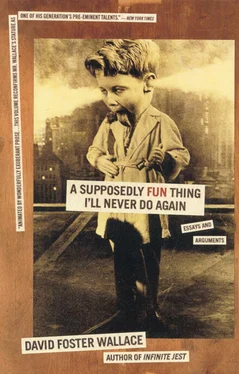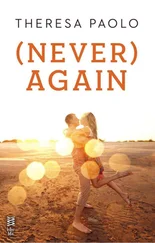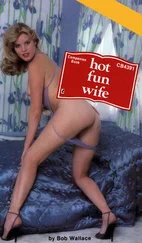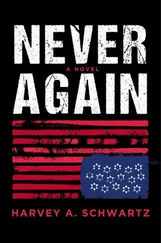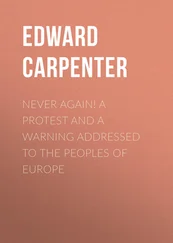39(solipsism being not exactly the cheery crackling hearth of psychophilosophical orientations)
40For somebody whose productions are supposed to be top-secret, Lynch and Asymmetrical seem awfully tolerant about having functionless interns and weird silent young people hanging around the Lost Highway set. Isabella Rossellini’s cousin is here, “Alesandro,” a 25ish guy ostensibly taking photos of the production for an Italian magazine but in fact mostly just walking around with his girlfriend in a leather miniskirt (the girlfriend) and grooming his crewcut and smoking nowhere near the butt can. Plus there’s also “Rolande” (pronounced as an iamb: “Rolande ”; my one interchange with Rolande consisted mostly of Rolande emphasizing this point). Rolande is an incredibly creepy French kid with a forehead about three feet high who somehow charmed Lynch into taking him on as an intern and lurks on the set constantly and does nothing but stand around with a little spiral notebook taking notes in a dense crabbed psychotically neat hand. Pretty much the whole crew and staff agrees that Rolande’s creepy and unpleasant to be around and that God only knows what the tiny precise notes really concern, but Lynch apparently actually likes the kid, and claps him avuncularly on the shoulder whenever the kid’s within reach, at which the kid smiles very widely and then afterward walks away rubbing his shoulder and muttering darkly.
41Lynch’s best-known painting, entitled Oww, God, Mom, the Dog He Bited Me , is described by Lynch in his Time cover-story this way: “There’s a clump of Band-Aids in the bottom corner. A dark background. A stick figure whose head is a blur of blood. Then a very small dog made out of glue. There is a house, a little black bump. It’s pretty crude, pretty primitive and minimal. I like it.” The painting itself, which is oddly absent from the book Images but has been published as a postcard, looks like the sort of diagnostic House-Tree-Person drawing that gets a patient institutionalized in a hurry.
42(not even the Lynch-crazy French film pundits who’ve made his movies the subject of more than two dozen essays in Cahiers du Cinéma —the French apparently regard Lynch as God, though the fact that they also regard Jerry Lewis as God might salt the compliment a bit …)
43(q.v. Baron Harkonen’s “cardiac rape” of the servant boy in Dune ’s first act)
44Here’s one reason why Lynch’s characters have this weird opacity about them, a narcotized over-earnestness that’s reminiscent of lead-poisoned kids in Midwestern trailer parks. The truth is that Lynch needs his characters stolid to the point of retardation; otherwise they’d be doing all this ironic eyebrow-raising and finger-steepling about the overt symbolism of what’s going on, which is the very last thing he wants his characters doing.
45Lynch did a one-and-a-half-gainer into this pitfall in Wild at Heart , which is one reason the movie comes off so pomo-cute, another being the ironic intertextual self-consciousness (q.v. Wizard of Oz, Fugitive Kind) that Lynch’s better Expressionist movies have mostly avoided.
46(= Master of Fine Arts Program, which is usually a two-year thing for graduate students who want to write fiction or poetry professionally)
47(I’m hoping now in retrospect this wasn’t something Lynch’s ex-wife did …)
48(e.g.: Kathleen Murphy, Tom Carson, Steve Erickson, Laurent Vachaud)
49This critical two-step, a blend of New Criticism and pop psychology, might be termed the Unintentional Fallacy.
50(i.e. “in-spired,” = “affected, guided, aroused by divine influence” from the Latin inspirare , “breathed into”)
51It’s possible to decode Lynch’s fetish for floating/flying entities — witches on broomsticks, sprites and fairies and Good Witches, angels dangling overhead — along these lines. Likewise his use of robins=Light in Wand owl=Darkness in TP : the whole point of these animals is that they’re mobile.
52(with the exception of Dune , in which the good and bad guys practically wear color-coded hats — but Dune wasn’t really Lynch’s film anyway)
53This sort of interpretation informed most of the positive reviews of both Blue Velvet and Twin Peaks .
54(which most admiring critics did — the quotation is from a 1/90 piece on Lynch in the New York Times Magazine )
55(Not to mention ignoring the fact that Frances Bay, as Jeffrey’s Aunt Barbara, standing right next to Jeffrey and Sandy at the window and making an icky-face at the robin and saying “Who could eat a bug?” then — as far as I can tell, and I’ve seen the movie like eight times — proceeds to PUT A BUG IN HER MOUTH. Or at least if it’s not a bug she puts in her mouth it’s a tidbit sufficiently buggy-looking to let you be sure Lynch means something by having her do it right after she’s criticized the robin for its diet. (Friends I’ve surveyed are evenly split on whether Aunt Barbara eats a bug in this scene — have a look for yourself.))
56As, to be honest, is a part of us, the audience. Excited, I mean. And Lynch clearly sets the rape scene up to be both horrifying and exciting. This is why the colors are so lush and the mise en scène so detailed and sensual, why the camera lingers on the rape, fetishizes it: not because Lynch is sickly or naively excited by the scene but because he — like us — is humanly, complexly excited by the scene. The camera’s ogling is designed to implicate Frank and Jeffrey and the director and the audience all at the same time.
57(prematurely!)
58I don’t think it’s an accident that of the grad-school friends I first saw Blue Velvet with in 1986, the two who were most disturbed by the movie — the two who said they felt like either the movie was really sick or they were really sick or both they and the movie were really sick, the two who acknowledged the movie’s artistic power but declared that as God was their witness you’d never catch them sitting through that particular sickness-fest again — were both male, nor that both singled out Frank’s smiling slowly while pinching Dorothy’s nipple and looking out past Wall 4 and saying “ You re like me” as possibly the creepiest and least pleasant moment in their personal moviegoing history.
59Worse, actually. Like most storytellers who use mystery as a structural device and not a thematic device, Lynch is way better at deepening and complicating mysteries than he is at wrapping them up. And the series’ second season showed that he was aware of this and that it was making him really nervous. By its thirtieth episode, the show had degenerated into tics and shticks and mannerisms and red herrings, and part of the explanation for this was that Lynch was trying to divert our attention from the fact that he really had no idea how to wrap the central murder case up. Part of the reason I actually preferred Twin Peaks ’s second season to its first was the fascinating spectacle of watching a narrative structure disintegrate and a narrative artist freeze up and try to shuck and jive when the plot reached a point where his own weaknesses as an artist were going to be exposed (just imagine the fear: this disintegration was happening on national TV ).
60This is inarguable, axiomatic. In fact what’s striking about most U.S. mystery and suspense and crime and horror films isn’t these films’ escalating violence but their enduring and fanatical allegiance to moral verities that come right out of the nursery: the virtuous heroine will not be serial-killed; the honest cop, who will not know his partner is corrupt until it’s too late to keep the partner from getting the drop on him, will nevertheless somehow turn the tables and kill the partner in a wrenching confrontation; the predator stalking the hero/hero’s family will, no matter how rational and ingenious he’s been in his stalking tactics throughout the film, nevertheless turn into a raging lunatic at the end and will mount a suicidal frontal assault; etc. etc. etc. etc. etc. The truth is that a major component of the felt suspense in contemporary U.S. suspense movies concerns how the filmmaker is going to manipulate various plot and character elements in order to engineer the required massage of our moral certainties. This is why the discomfort we feel at “suspense” movies is perceived as a pleasant discomfort. And this is why, when a filmmaker fails to wrap his product up in the appropriate verity-confirming fashion, we feel not confusion or even offense but anger, a sense of betrayal — we feel that an unspoken but very important covenant has been violated.
Читать дальше
